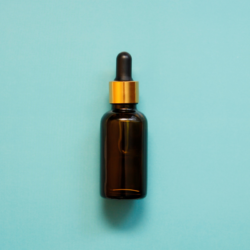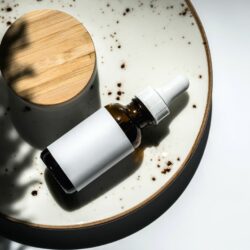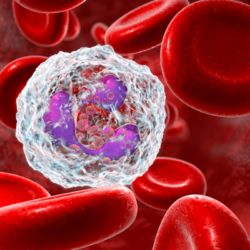Melatonin, often referred to as the ‘sleep hormone’, is widely known for regulating the circadian cycle. However, recent research has revealed that it also plays a crucial role in skin health. By acting directly on skin cells via specific receptors such as MT1, melatonin offers antioxidant, anti-inflammatory and anti-ageing properties.
What is melatonin?
Melatonin is a hormone produced mainly by the pineal gland in the brain. It regulates the sleep-wake cycle (circadian rhythm) and is secreted in response to darkness. However, the skin also has its own melatonin production system, particularly in response to environmental damage such as exposure to UV rays. In addition to its primary function of regulating sleep, this hormone acts as a powerful antioxidant, protecting cells against oxidative damage.
It is important to note that there are two main forms of melatonin used in dermatology: endogenous melatonin, produced naturally by the body, and topical melatonin, applied directly to the skin via skincare products.
Melatonin receptors in the skin: MT1
A fascinating aspect of the cutaneous benefits of melatonin lies in the activation of specific receptors located on the surface of skin cells. The MT1 receptor has been identified as having a direct influence on skin health. Studies have shown that alterations in circadian rhythms disrupt melatonin synthesis in the skin, causing imbalances at the cellular level.
The MT1 receptor is crucial for skin repair and protection against external aggression. Poor sleep, for example, can increase production of the stress hormone cortisol, causing collagen breakdown and reducing skin blood flow. This leads to dull skin, inflammation and the appearance of dark circles under the eyes, visible signs of premature ageing.
What role does melatonin play in the health of your skin?
Because of its antioxidant properties, melatonin contributes to cell regeneration and repair of damage caused by environmental factors, particularly UV rays. By protecting cells against oxidative stress, it helps to maintain healthy skin and improve its overall appearance.
Recent research has shown that the application of topical melatonin helps to reduce inflammation and stimulate the production of collagen, a protein essential for skin firmness and elasticity. It also reduces the impact of free radicals, the unstable molecules responsible for premature skin ageing.
Melatonin and oxidative stress: an anti-ageing shield
Protection against oxidative stress is one of the main benefits of melatonin for the skin. Free radicals, which form in response to aggressions such as UV rays and pollution, cause damage to skin cells, accelerating the ageing process.
Melatonin acts as a powerful antioxidant by neutralising these free radicals and reducing the effects of oxidative stress. In vitro studies have shown an 18% to 26% reduction in reactive oxygen species (ROS) in stressed skin cells following application of melatonin at a concentration of 0.002%.
Collagen is a structural protein that is crucial for maintaining the skin’s firmness and elasticity. With age, collagen production declines, leading to the appearance of wrinkles and a loss of tone.
Research has shown that melatonin stimulates the production of type I and III collagen in skin cells. In vitro experiments have shown a 42% increase in the production of type I collagen and a 31% increase in type III collagen, demonstrating the effectiveness of melatonin in combating skin ageing.
What are the natural alternatives to melatonin?
A natural alternative to melatonin is the HACCE complex (Helianthus annuus cell culture extract), a sunflower cell extract rich in flavonoids, polyphenols and phyto-melatonin. This complex has been studied for its melatonin-like properties and its positive effects on the skin.
Clinical studies have shown that applying HACCE at a concentration of 1% to stressed volunteers for one month resulted in a significant reduction in skin stress and a visible improvement in skin quality. By mimicking the effects of melatonin, HACCE demonstrated its ability to reduce inflammation, increase collagen production and improve skin elasticity.
What is the skin-brain link?
The concept of the skin-brain connection is at the heart of melatonin’s beneficial effects on the skin. By regulating stress levels through the activation of MT1 receptors in the skin, melatonin helps to reduce the visible signs of ageing associated with stress, such as wrinkles and loss of elasticity.
This interaction between the nervous system and the skin highlights the importance of good sleep hygiene for skin health. Restorative sleep combined with good stress management contributes to healthier, more radiant skin.
Sources
- Neurocosmetics in Skincare-The Fascinating World of Skin-Brain Connection: A Review to Explore Ingredients, Commercial Products for Skin Aging, and Cosmetic Regulation





